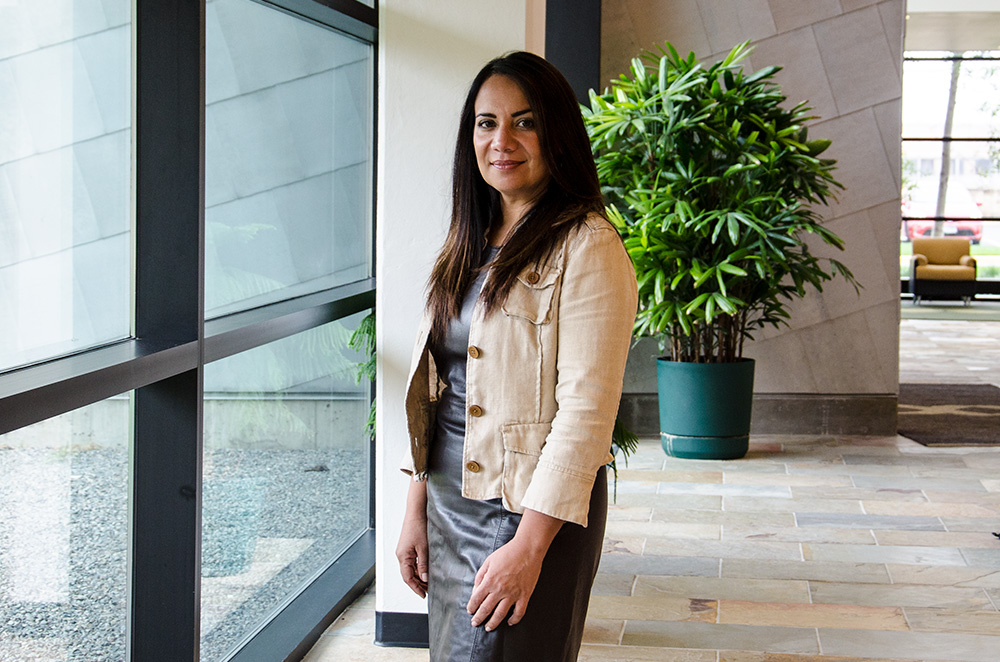Elizabeth “Liz” Wieling’s passport reads like an atlas of the world. Brazil, Mexico, Sri Lanka, Iraq, and Uganda are among the nations where she has worked and researched to create evidence-based interventions to help and heal families impacted by trauma.
Trauma in Wieling’s work means war and organized violence. As an associate professor of family social science, she juggles a schedule of classroom teaching, research, and writing that are engaged in diverse communities and require frequent travel. Wieling’s gracious demeanor seems a contrast to her whirlwind schedule.
This summer, for example, she spent several weeks in Uganda with a cross-cultural team implementing a parenting intervention that is being tested for effectiveness among families affected by decades of war and dislocation. Team members include local partners as well as graduate students from Minnesota and Germany.
“There are many non-governmental organizations working in Uganda,” says Wieling, “but none are doing this kind of work.”
Wieling and the students co-facilitated a nine-session pilot of the parenting intervention with 14 mothers. Changes for participating mothers soon began to be apparent. One reported that she was seeing love in her family that she did not know was possible. Several mothers said their family members were noticing changes they had already made in themselves and their families.
Such preliminary observations give hope for interventions that can help families to keep the violence inflicted upon themselves from passing to the next generation.
“‘Social justice’ is the umbrella over the work that I do,” says Wieling, “and it is an activist agenda. We have evidence-based interventions for individuals, but almost none for families in this area. And, even when we know an invention works in one culture, we don’t know if it will work in another. So the complexities are great and often makes the work very slow.”
Paying attention to culture
Wieling (pronounced WEE-ling) comes to her work from a bicultural family, her father from Iowa, her mother from Brazil. When Wieling was about eight years old, her family moved to the Amazon region for several years, where her parents worked in a remote community impacted by dislocation and change.
“This is where my eyes became opened,” she says. “I was able to see the suffering of people living in very isolated places. The suffering of women and children was especially great. After living there, I knew I needed to use my life to make the difference I could. I wanted to go to places and work with communities that seemed to be forgotten by the world because of their invisibility or purposeful neglect.”
At first Wieling thought she would work in international business or law. She came alone to Iowa at 16 to complete a B.A. at a small liberal arts college, followed by a year working in Asia and learning Chinese. But she returned to Iowa for a master’s and then a Ph.D. in human development and family studies plus marriage and family therapy.
For her dissertation, Wieling conducted field research outside Oaxaca, Mexico, interviewing families about the educational choices they made for their children. It was a small but important study, qualitative as well as quantitative. Wieling learned many skills and came away with an appreciation for patience.
“It took a long time. Sometimes I would walk for miles to interview a family. Sometimes it took days to find the family I was looking for,” she remembers. “When you’re working across cultures, it takes time.”
From Iowa, Wieling took a position in Texas where she worked with many Latino families. She found valuable early professional mentorship from Richard and Karen Wampler and made important connections to leading researchers in the field, including Marion Forgatch at Oregon Social Learning Center (OSLC). With Forgatch, Wieling was awarded a five-year grant from the National Institute of Mental Health to implement the OSLC Parenting Through Change model with single Latina mothers.
Joining forces to respond
Wieling was recruited to Minnesota’s Department of Family Social Science and arrived in the summer of 2001. Just a few weeks later she found herself in New York engaged in 9/11 response, accompanying colleague Pauline Boss, a professor and pioneer in the study of ambiguous loss.
Together with other colleagues in New York, Boss and Wieling worked on a community-based intervention with families of missing union workers. Wieling also met many of the colleagues she continues to work with today. Among them are the members of Victims Voice, or Vivo, a group of German-based researchers that led her to Uganda.
Here in Minnesota, Wieling’s work ranges from collaborating with colleagues at the Center for Victims of Torture to co-authoring a new book, Knowing and Not Knowing in Intimate Relationships, with professor emeritus Paul Rosenblatt.
People often ask Wieling how she can stand hearing about so much pain.
“I get so much more than I give,” she replies. “People are so generous. There is devastation, but there is also so much love.”
Read more about Liz Wieling and the Department of Family Social Science.
Parts of this profile are adapted from “Triangles for Change,” a story published in the fall 2013 issue of Connect magazine.
Story by Gayla Marty | October 2013
